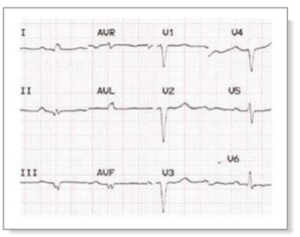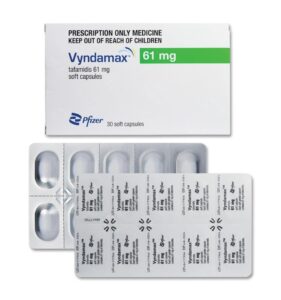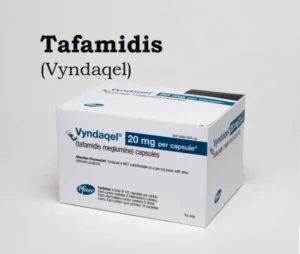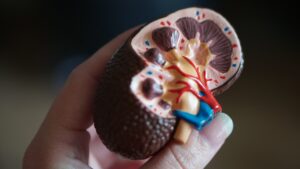Wild-Type ATTR Amyloidosis
Chest Pain (Cardiac Amyloidosis)
Chest pain is a frequent symptom in patients with cardiac amyloidosis (CA) and is associated with a more advanced cardiac impairment. [source: International Journal of Cardiology]
Shortness of breath when lying flat (Orthopnea)
People with more severe heart failure may experience shortness of breath when they lie down. The medical term for this symptom is orthopnea (say “or-THAWP-nee-uh”). The severity of this symptom usually depends on how flat you are lying—the flatter you lie, the more you feel short of breath.
Low QRS voltages (LQRSVs) (Cardiac Amyloidosis)
Typical ECG of a patient with cardiac AL amyloidosis showing low QRS voltages in the limb leads and pseudoinfarction pattern in the chest leads. (from Updates in Cardiac Amyloidosis: A Review; Banypersad S et al; J Am Heart Assoc 2012)
Characteristic discrepancy between peripheral and precordial leads (ATTRcm)
Fatigue (Cardiac Amyloidosis / General Organ Stress)
When amyloid proteins overwhelm your organs, you may not have the energy and strength you once had. Amyloidosis can cause severe, unusual fatigue. You may not feel up to doing the activities you once enjoyed. You may even need frequent naps during the day. [source: healthline]
Carpal Tunnel Syndrome (Amyloid Neuropathy)
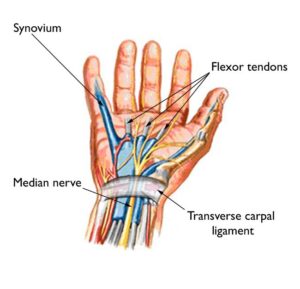
In patients undergoing surgery for idiopathic CTS, a recent study identified amyloidosis by tenosynovial biopsy in 10.2% of men older than 50 years and women older than 60 years; all positive patients had bilateral symptoms. [source: NIH]
Tafamidis (Vyndamax™) – Treats Cardiomyopathy
Tafamidis is an oral medication for treating cardiomyopathy and peripheral neuropathy due to transthyretin amyloidosis (ATTR). It is a transthyretin stabilizer and has been shown to reduce disease progression and mortality significantly.
Diuretics (Increase Urination)
Tafamidis Meglumine (Vyndaqel®) Treats Cardiomyopathy
Both Vyndaqel and Vyndamax contain the same active ingredient called tafamidis. The difference between Vyndaqel and Vyndamax lies in the form of tafamidis they contain. Vyndaqel contains the micronized meglumine salt of tafamidis, while Vyndamax contains the free acid form of tafamidis
Care Team Basics
Studies have found that patients who receive care from a coordinated care team have better health outcomes, including lower rates of hospitalization and mortality. They also have higher rates of satisfaction with their care.
A care team is a group of healthcare professionals who work together to provide care for a patient. The care team may include doctors, nurses, therapists, social workers, and other specialists. The team works together to develop a plan of care and coordinate services.
Care Team Coordinator
A care coordinator is a health care professional responsible for managing patient care by monitoring treatment plans, educating patients on their conditions, and connecting them to relevant health care providers.
Cardiologist (Heart)
A cardiologist is a physician who’s an expert in the care of your heart and blood vessels. They can treat or help you prevent a number of cardiovascular problems. They can also specialize in specific areas, such as abnormal heart rhythms, heart failure or heart problems you’ve had since birth. [source: Cleveland Cllinic]
Nephrologist (Kidneys)
A nephrologist is a medical doctor who specializes in kidney care and treating diseases of the kidneys. The term nephrologist comes from the Greek word “nephros”, which means kidney or renal and “ologist” refers to someone who studies. Nephrologists are also called kidney doctors.
Psychologist (Emotional Wellbeing)
A psychologist is a mental health professional who uses psychological evaluations and talk therapy to help people learn to better cope with life and relationship issues and mental health conditions. [source: Cleveland Clinic]
Social Worker
Social workers assist a range of patient populations and provide services in areas including mental health conditions and addictions, chronic disease, children and youth illnesses, geriatrics illnesses, grief, trauma, parenting issues, palliative care, dementia and other neurological issues, financial stressors, housing issues and a broad range of other general psychosocial issues (Ashcroft et al. 2018; McGregor et al. 2018; Sverker et al. 2017).
ATTR Clinical Trials
- Current ATTR Amyloidosis Clinical Trials
- ATTR Trials in The News
Research
Stay Up To Date:
Featured Resources

Caregiver Support : Taking care of yourself




